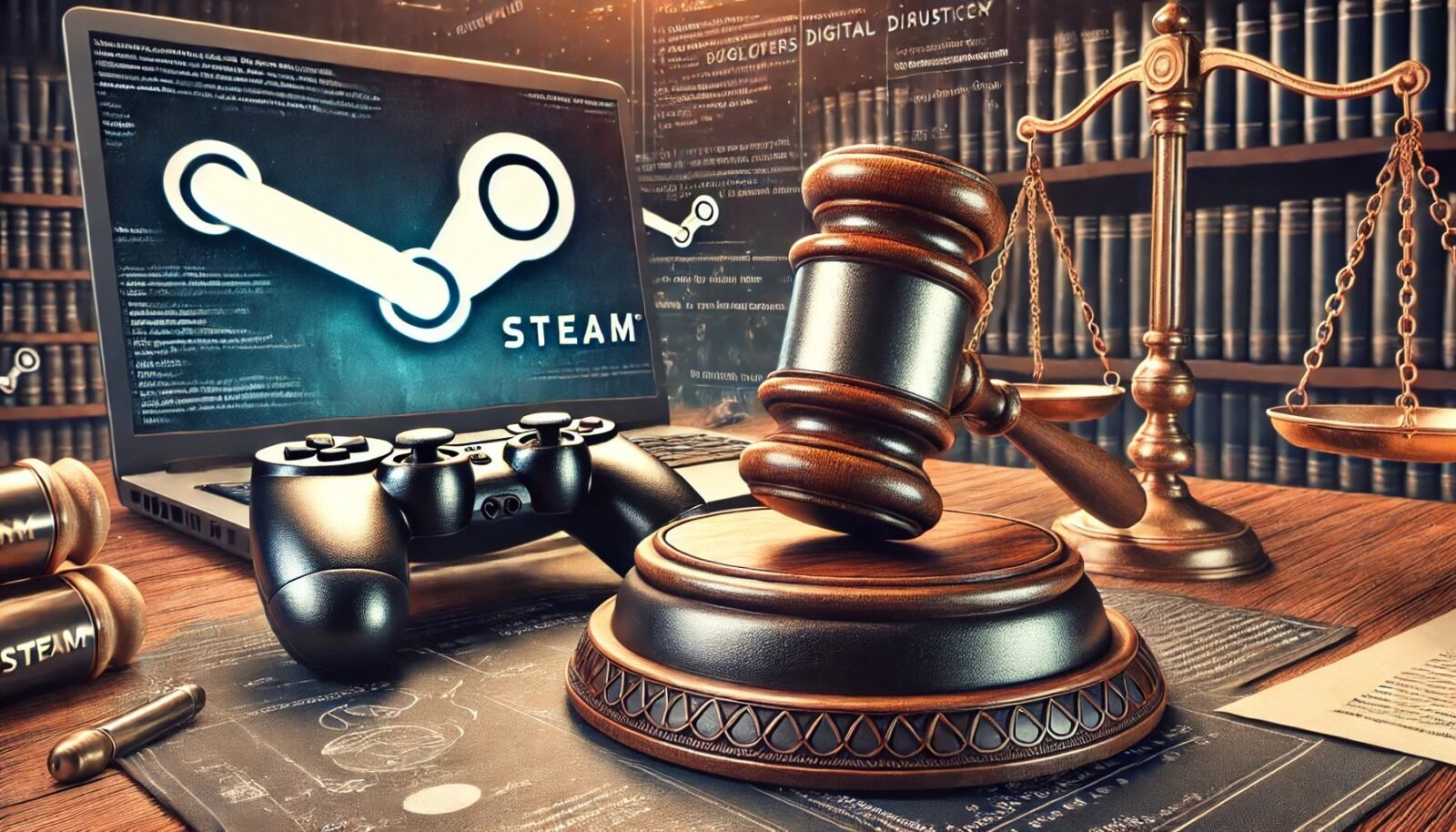Introduction to Steam and its Legal Challenges
Steam is one of the most popular gaming platforms. It was created by Valve Corporation in 2003. Gamers use Steam to buy, download, and play video games. It is famous for its large selection of games and its strong community features, like multiplayer gaming, forums, and game updates. Many developers use Steam to reach gamers because it offers easy access to a huge market.
However, the digital distribution industry is not free from legal problems. As Steam grew in size, legal issues started to arise. These problems often focus on how Steam controls the market, how it manages its store, and how it sets rules for game developers. Lawsuits against Steam claim that it uses unfair methods to dominate the digital distribution industry, making it hard for competitors and game developers to operate freely. Understanding these legal challenges is important for gamers and developers.
Overview of the Steam Lawsuit
What is the Steam Lawsuit?
The Steam lawsuit is a legal case against Valve Corporation, which operates Steam, one of the biggest gaming platforms. The lawsuit accuses Steam of using anti-competitive practices in the digital distribution industry. It claims that Valve enforces rules that limit how game developers can price their games on other platforms, giving Steam an unfair advantage.
Key Parties Involved in the Lawsuit
The main party in the Steam lawsuit is Valve Corporation, the company behind Steam. The lawsuit was filed by several game developers and companies who argue that Valve’s policies harm their ability to sell games on other platforms. The legal team representing these developers is also an important player in this case.
Timeline of Events Leading to the Lawsuit
- 2003: Valve launches Steam as a gaming platform.
- 2010-2015: Valve introduces rules that start raising concerns among developers.
- 2020: Lawsuit filed, accusing Steam of unfair practices in the digital distribution industry.
- 2021-2023: Ongoing court proceedings, with arguments from both sides.
- Present: The lawsuit continues to be a major legal challenge for Steam, with potential consequences for the entire gaming industry.
Legal Grounds of the Lawsuit
Antitrust Allegations Against Steam
The Steam lawsuit includes serious antitrust allegations. It claims that Steam uses its power to control prices and limit competition in the digital distribution industry. This means Valve, the company behind Steam, is accused of making it hard for other platforms and game developers to compete fairly.
Monopoly Concerns and Anti-Competitive Practices
The lawsuit also highlights monopoly concerns. Steam dominates the gaming platform market, and the plaintiffs argue that Valve uses anti-competitive practices to keep this dominance. For example, Steam forces developers to agree to rules that prevent them from selling their games at lower prices on other platforms. This practice discourages competition and hurts consumers who might pay higher prices.
Copyright Infringement and Intellectual Property Issues
Some parts of the Steam lawsuit touch on copyright infringement and intellectual property problems. Game developers claim that Steam has rules that restrict how they can protect and profit from their own creations. These issues add another layer of complexity to the legal battle, as copyright infringement is a serious matter in the gaming industry.
Impact on Developers and Consumers
How Developers Are Affected by Steam’s Policies
Developers face significant challenges due to Steam’s policies. The lawsuit claims that Steam forces developers to follow strict rules about pricing, which prevents them from offering their games at lower prices on other platforms. This limits their ability to reach a wider audience and make more sales. Additionally, the high fees charged by Steam reduce the profits developers can earn from their games, making it harder for smaller studios to grow.
Consumer Concerns: Pricing, Refunds, and In-App Purchases
Consumers are also affected by Steam’s policies. One of the main concerns is pricing. Because Steam controls how games are priced across platforms, gamers might end up paying more than they should. Refunds and in-app purchases are other issues. Steam’s refund policy can be restrictive, and some players find it difficult to get their money back if they are not satisfied with a game. In-app purchases can also be a source of frustration, as gamers feel pressured to spend more money to enjoy a full experience.
The Lawsuit’s Potential Impact on the Gaming Community
The outcome of the Steam lawsuit could have a huge impact on the entire gaming community. If Steam is forced to change its practices, developers might have more freedom in how they sell their games, and consumers could benefit from lower prices and better services. However, if Steam wins the case, the current system will likely remain unchanged, and both developers and gamers will continue to deal with the same issues.
Notable Cases Involving Steam
Highlight Specific Steam-Related Lawsuits
Over the years, several lawsuits have been filed against Steam. One major case involves antitrust lawsuits, where Valve has been accused of using its dominant position to stifle competition in the digital distribution industry. Another significant case involves copyright claims, where developers have accused Steam of not adequately protecting their intellectual property. These legal battles have drawn attention to how Steam’s policies affect both developers and competitors in the gaming market.
Overview of Significant Settlements or Court Rulings
In some cases, Steam has reached settlements to avoid prolonged legal disputes. For example, in previous antitrust lawsuits, Valve agreed to make changes to certain policies to address the concerns of competitors and developers. However, not all cases end in settlement. Some have led to important court rulings that shaped how Steam operates. These rulings often highlight the balance between Steam’s market control and the need for fair competition in the gaming industry.
Steam’s Defense and Response
How Steam/Valve is Responding to the Allegations
In response to the Steam lawsuit, Valve has denied the allegations, stating that their gaming platform operates within the law and does not engage in anti-competitive practices. Valve argues that Steam provides a fair marketplace for developers and gamers, and the company maintains that their policies are in line with industry standards.
Statements from Steam or Its Legal Representatives
Legal representatives for Steam have issued statements defending Valve’s business model. They assert that Steam’s success is due to its innovation and customer service, not any unfair control of the digital distribution industry. In public comments, Valve’s legal team has emphasized that the lawsuit misrepresents how Steam works and that the platform benefits both developers and consumers.
Possible Legal Strategies Steam Might Adopt
To fight the lawsuit, Valve could adopt several legal strategies. One approach is to demonstrate that the gaming market remains competitive, with many other platforms available for developers and consumers. Valve might also present evidence showing that its pricing policies and store rules do not violate antitrust laws. Additionally, Steam may seek to settle out of court to avoid further legal costs and damage to its reputation.
Implications for the Digital Gaming Market
How This Lawsuit Could Reshape Digital Distribution Platforms
The Steam lawsuit has the potential to bring major changes to the digital distribution industry. If the court rules against Steam, it could force Valve to change how it operates its platform. This might open the door for other gaming platforms to compete more freely, leading to more options for developers and consumers. The lawsuit could encourage other companies to rethink their business models to avoid similar legal issues, reshaping how digital games are sold and distributed.
Potential Changes to Steam’s Business Practices if Found Guilty
If Steam is found guilty, the company may have to modify several of its business practices. This could include allowing developers to set different prices for their games on other platforms, reducing the fees it charges developers, or loosening some of its store policies. These changes would likely benefit developers by giving them more control over how they sell their games and could result in lower prices for consumers. Steam may also need to adopt more transparent and flexible refund and in-app purchase policies to comply with new legal standards.
Related Legal Precedents
Analysis of Similar Lawsuits in the Tech or Gaming Industry
There have been several similar lawsuits in both the tech and gaming industries, which could provide important insights into the Steam lawsuit. For example, the Epic Games vs. Apple lawsuit involved allegations of anti-competitive practices related to app store policies. Much like Steam, Apple was accused of controlling pricing and limiting how developers could distribute their apps. The Microsoft antitrust case from the 1990s is another key example, where Microsoft was sued for using its monopoly in the operating system market to crush competition.
How Past Cases May Influence the Outcome of the Steam Lawsuit
These past cases could have a direct influence on how the Steam lawsuit is decided. In the Epic Games case, courts ruled that some of Apple’s practices were indeed anti-competitive, which might set a precedent for how the court views Steam’s policies. Likewise, the Microsoft case established clear guidelines on how tech companies with dominant market positions should behave, which could lead to similar rulings for Valve. The outcomes of these cases could push the court to either side, depending on how closely they align with the issues Steam is facing.
Future Outlook for Steam and the Gaming Industry
Possible Outcomes of the Lawsuit
There are several possible outcomes for the Steam lawsuit. If Valve is found guilty of anti-competitive practices, the court could order changes to Steam’s policies and require Valve to pay damages to the affected developers. Valve may also be forced to allow more pricing flexibility on other platforms. Alternatively, Valve could win the case, which would allow Steam to continue operating as it currently does without any significant changes.
Long-Term Consequences for Valve/Steam and Other Gaming Platforms
The lawsuit’s outcome will likely have long-term consequences for both Valve/Steam and other gaming platforms. If the court rules against Steam, Valve might face stricter regulations and financial penalties, which could reduce its dominance in the market. This could create more opportunities for competitors like Epic Games Store, GOG, and other digital distribution platforms. On the other hand, if Valve wins, it could strengthen Steam’s position as the leading gaming platform, but it might also face more scrutiny from regulators in the future.
Predictions for the Digital Distribution Space Post-Lawsuit
After the lawsuit, the digital distribution space is expected to evolve. If Steam is required to change its practices, the market could become more competitive, leading to better pricing and options for both developers and consumers. This may encourage innovation among gaming platforms and push them to offer more favorable terms to attract developers. However, if the lawsuit fails, Steam might maintain its stronghold, but other platforms could still look for ways to challenge its market dominance by offering unique services or better revenue-sharing models.
Conclusion
The Steam lawsuit highlights critical legal issues within the digital distribution industry, particularly concerning antitrust allegations, monopoly concerns, and the impact on both developers and consumers. The outcome of this lawsuit could reshape the future of Steam and other gaming platforms, influencing how games are priced, distributed, and sold. Whether Steam is found guilty or not, the case is a significant moment in the gaming world, and its effects will likely be felt by developers, consumers, and competitors alike. The gaming community awaits the resolution of this lawsuit, as it could mark the beginning of a new era in the digital gaming market.
Frequently Asked Questions (FAQs)
What is the Steam lawsuit about?
The Steam lawsuit involves accusations against Valve for engaging in anti-competitive practices within the digital distribution industry. It centers around claims that Steam limits how developers can price and sell their games on other platforms, which stifles competition.
Who filed the lawsuit against Steam?
The lawsuit was filed by several game developers and companies who argue that Steam’s policies negatively impact their ability to compete in the marketplace by enforcing unfair rules.
How does the Steam lawsuit affect developers?
Developers are impacted by Steam’s policies, which allegedly force them to maintain the same prices on other platforms, restricting their ability to offer discounts and better deals elsewhere. This reduces their profit margins and limits competition.
How does the lawsuit affect consumers?
Consumers may be paying higher prices for games due to Steam’s pricing policies. The lawsuit could lead to more competitive pricing, better refund policies, and improved options for in-app purchases, benefiting the consumer experience.
What could happen if Steam loses the lawsuit?
If Steam loses the lawsuit, Valve might be required to change its business practices, allowing more flexibility for developers and reducing fees. This could lead to lower prices and better services for gamers, while opening up competition for other platforms.
Will this lawsuit change how digital gaming platforms operate?
Yes, if Steam is found guilty, it could set a precedent that forces other gaming platforms to rethink their practices. It could lead to more open competition, benefiting both developers and consumers across the industry.
Read For More Amazing Blogs Law Firm Genius.
















Got a Questions?
Find us on Socials or Contact us and we’ll get back to you as soon as possible.